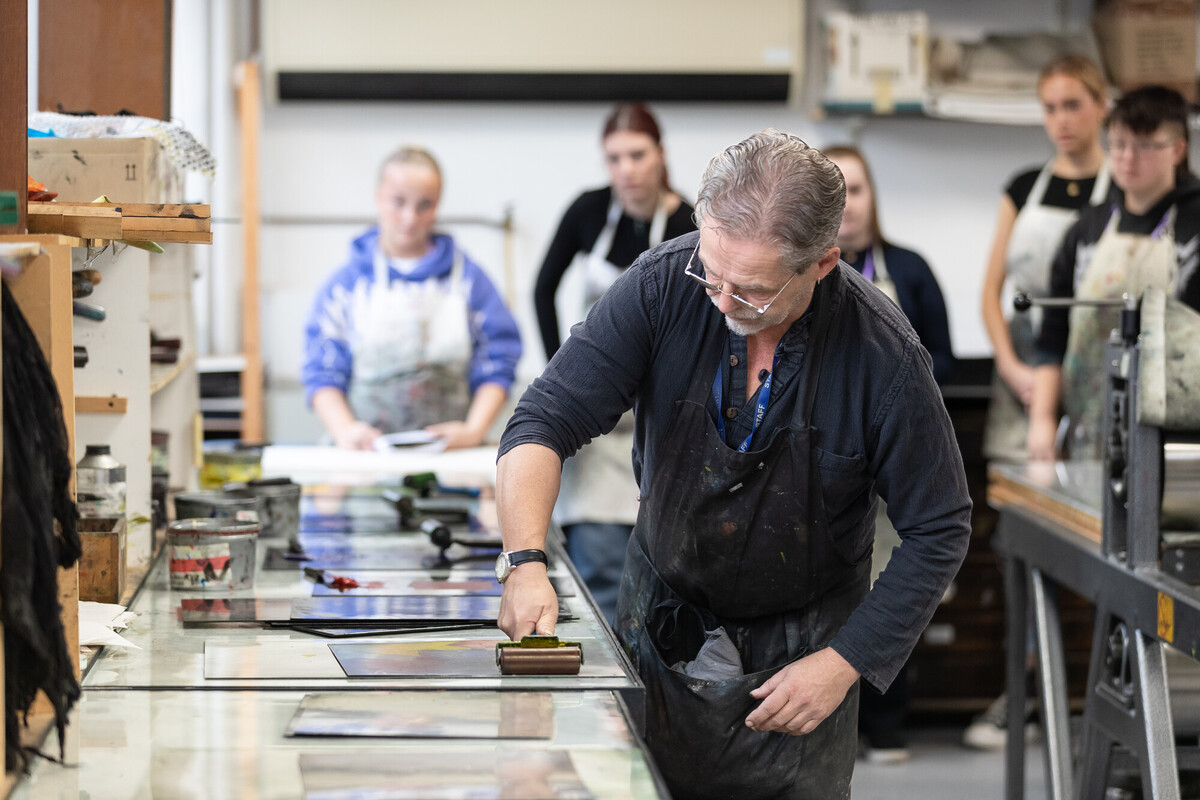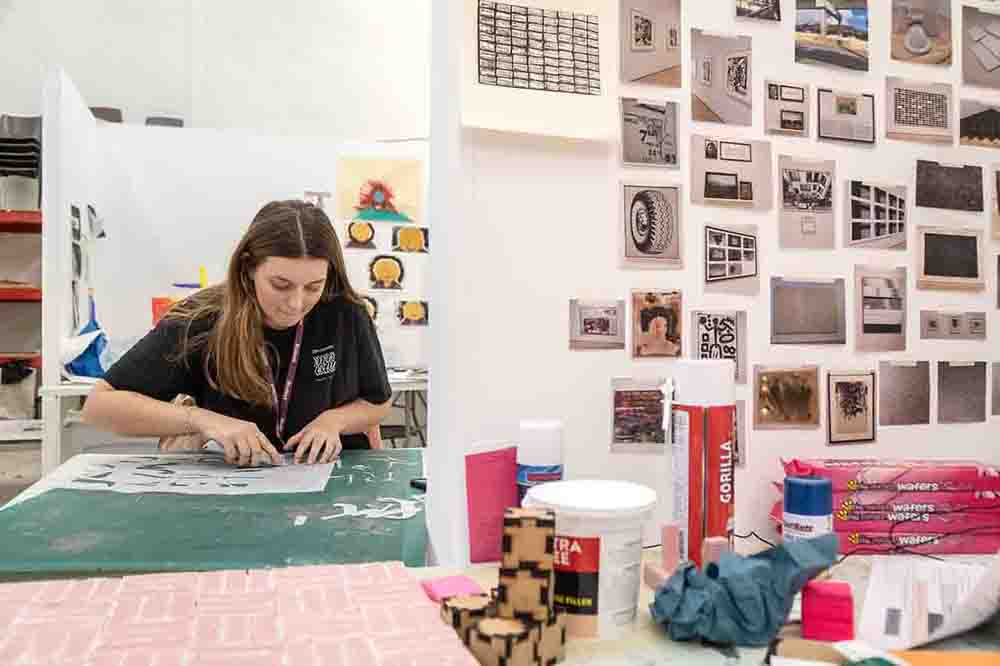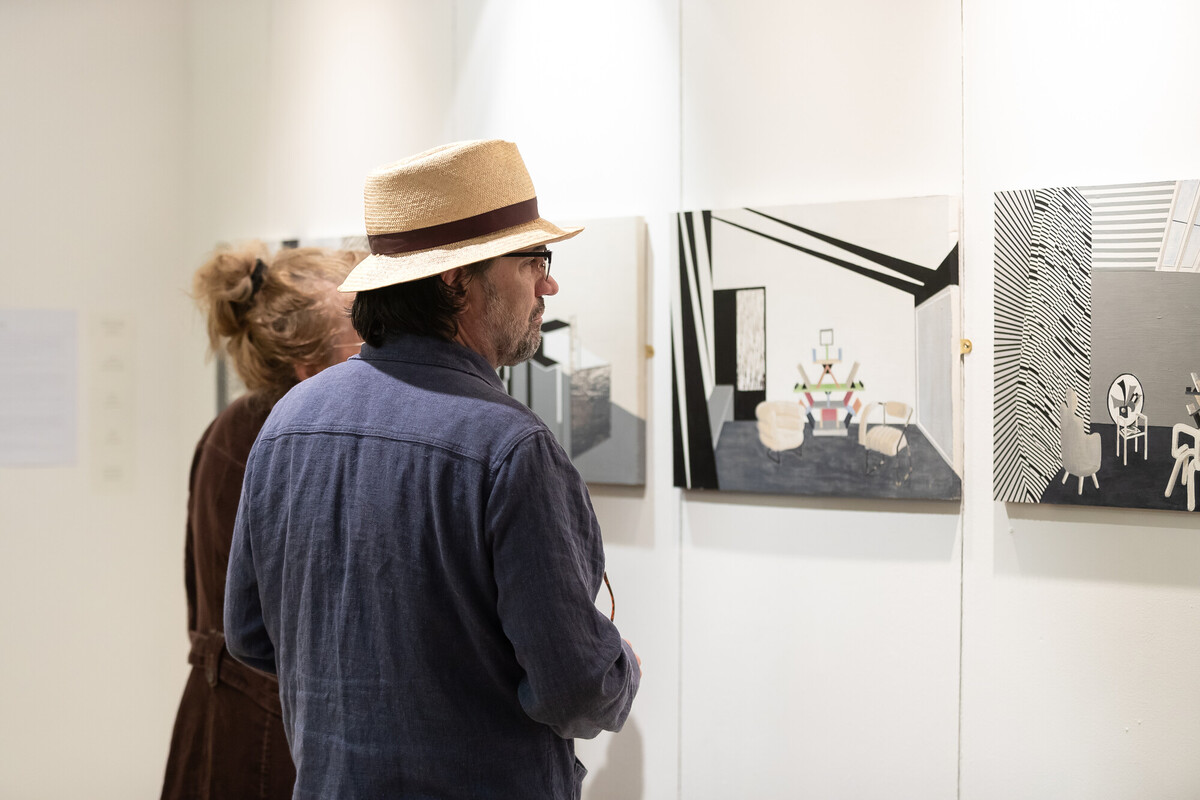Fashion Design BA (Hons)


Available with:
- Foundation Year
You are viewing Course summary
Course Summary
Fashion Design is a fast-paced and practically driven course aimed at inquisitive and hardworking individuals, who are strongly motivated to develop their own unique creative design identity.
The course places innovative design thinking at the heart of its delivery, and engages students to create design concepts that push the boundaries between current and future design practice.
Studio, lecture and workshop sessions encourage inquisitive learning, and internship opportunities provide industry relevance to theory and practice-based modules.
You will gain expertise in key practical and digital production skills to expand your professional design knowledge in preparation for job markets within the fashion industry. Also, industry driven projects place employability at the centre of learning.
Graduates from the course have designed for luxury, premium and online brands, undertaken internships with major fashion companies and gained grants to set up their own businesses.
Design brands and industry professionals are invited to provide advice, guidance and insight into current working methods within the fashion industry.
Your learning will take place within a very ‘hands on’ supportive environment, which stimulates critical intellectual growth and promotes creative and professional independence in preparation for the fashion industry.
What You'llStudy
Module content:
- Reading and writing critically.
- Constructing and evaluating an argument.
- Note-taking techniques for reading and listening.
- Understanding plagiarism and academic integrity.
- Introduction to reflective practice.
- Preparing for, and delivering, powerpoint presentations.
- Referencing and citation.
- Summarising and paraphrasing written sources.
- Literature searching.
- Report writing.
- The culture and expectations of higher education.
- The assessment process including the role of assessment criteria and feedback.
- The nature of research journal publishing.
Whilst much of the content above is generic, students will be encouraged to situate skills within the context of the undergraduate discipline they are entering, which leads to some variation in emphasis for certain skills.
Module aims:
1.To raise awareness of the range of study skills required for successful higher education studies, including the process of academic writing, reading strategies, seminar skills, organisation of time and materials, planning for and meeting deadlines, understanding and responding to feedback.
2. To introduce students to concepts such as plagiarism, academic integrity and appropriate use of artificial intelligence tools.
3. To facilitate an effective transition into higher education by exploring, and providing guidance in, the key elements of successful undergraduate studentship including students' understanding of taking responsibility for their own learning.
4. To teach students how to undertake a literature, visual or data review for their discipline and be able to differentiate between a valid, reliable source and an unsubstantiated or irrelevant source.
Module content:
- Research and planning skills.
- Becoming familiar with topics that comprise their undergraduate degree subject.
- Developing a knowledge base for a discipline of study.
- Identifying areas of interest.
- Application and development of critical analytical skills.
- Development of self-directed study.
- Use of learning resources.
Module aims:
1. To develop students' skills in planning and writing an essay.
2. To familiarise students with the process of tutor supervision for a written piece of work.
3. To give students an opportunity to focus on a topic within their undergraduate degree subject.
4. To write a piece of work that allows the student to broaden and deepen knowledge on a topic of their choice.
5. To prepare and deliver an academic poster presentation outlining the student's research topic.
Module content:
- Introduction to Marketing Strategies
- Understanding the Marketing Mix (product, price, place and promotion)
- Influences on Target Market & Segmentation
- Marketing events
Module aims:
- To introduce students to a range of Marketing concepts & principles.
- To develop students' understanding of the Marketing Mix in the modern world of business.
- To provide a foundation-level knowledge base of business marketing
Module content:
- Creative tools and methods used in the construction of visual messages.
- Analogue and digital visualization media.
- Colour theory.
- Basic elements and principles of design.
- Media manipulation and practice with creative problem solving methods.
- Analytical and observational visualization techniques exploring line, volume, tone, spatial relationships, composition, form and perspective through drawing, photography and screen based digital tools.
Module aims:
1. To acquire and apply the skills and techniques necessary for the creation of visual communication messages and artefacts.
2. To identify problems and issues related to exploiting tools and media in visual arts practice.
3. To appreciate the creative dynamic generated through the interaction of ideas, material/medium practice and context.
4. To work and contribute within a group environment and develop a capacity for self dircted study.
Module content:
- Identify concepts that underpin and inform visual communication practice.
- Introduce ideas on narrative, design, communication, creativity, imagination, semiotics and interpretation.
- Exploring concepts and methods of constructing meaningful visual communication messages.
- Understanding differing demands of self-expression and communication problem solving.
Module aims:
1. Develop an awareness of the scope of the conceptual and practical frameworks associated with visual communication practice.
2. Develop the ability to exploit visual language to create effective visual communication.
3. Develop the ability to generate ideas and identify appropriate working methods in response to visual communication challenges.
4. Develop independent creative decision-making and the capacity for self directed study.
5. Identify and utilise appropriate research strategies and information retrieval procedures.
Module content:
- Introduction to semiotics and visual language
- Emerging trends: environment and interiors
- The birth and evolution of cinema
- The human commodity: advertising, celebrity and reality television
- Introduction to postmodernism and popular art
- Photography as social commentary
- The internet and digital spaces
Module aims:
1. To develop students' understanding of western civilization through an understanding of that civilization's visual texts.
2. To develop students' abilities to communicate orally, visually and through academic writing.
3. To develop students' interpretative abilities through the promotion of skills of visual interpretation.
You will be introduced to the basic skills and principles of fashion design, supported by key aspects related to the theory and practice of the discipline.
Module content:
Level 4 introduces students to
- The fundamental concepts, theories and principals associated with their individual subject area
- The broad critical, historical, contemporary contexts and future potential of their area of study and the significance of the work of other practitioners within their field of study
- A variety of approaches to research, within, through and about their area of study
- The basic skills and techniques required to produce outputs in response to set briefs
- The visual and verbal communication techniques appropriate to their subject area
- The tools, technologies and materials relevant to their subject area
- A range of approaches to problem solving
- The importance of taking personal responsibility for their own learning
Module aims:
The aim of this module is to introduces the key aspects of a level 4 degree within Art or Design, including:
- foundational knowledge,
- problem-solving skills,
- effective communication,
- personal responsibility,
- subject specific skills and
- the development of important attributes required for employment within and beyond the creative and cultural industries
Will extend your skills, developing a more professional approach to practice but also experimenting, testing out ideas and developing your own interests and fashion design specialisms.
Module content:
The traditional academic programme structure is not applicable in relation to this work placement-based experiential learning module. The experiential content is freely structured and determined by negotiation between the student, UoC placement supervisor and host organisation placement supervisor. It is informed by the module’s overarching aims and learning outcomes and by the objective of optimising added value for both the host organisation and the student experience (including graduate outcomes).
A mid-placement workshop, usually held in Chester in February, will enable peer to peer sharing of experiential learning feedback and allow an analysis of the range of skills and benefits derived from the placement. The workshop will also support students’ development of their learning portfolio, and provide an opportunity to access an overview of final year module options ahead of L6 module selection. In-person and online participation in the mid-placement workshop will be enabled.
All students will engage in the drawing up of a learning agreement on acceptance of the placement that will cover a contact plan and agreed learning outcomes with their designated academic tutor and placement supervisor.
Module aims:
This module introduces students to the working environment enabling them to put into practice the theories and skills developed in the first two years of the programme. Its aims are:
- To provide an opportunity for students to apply and enrich their previous theoretical knowledge and understanding of course content through observation of and insights derived from working in an organisation and professional environment.
- To enable students to develop their practical and transferable skills in an industry environment and to experience a broad range of tasks and responsibilities within their field of interest
- To enable students to pursue professional and personal development in an applied environment
- To enable students to recognise the nature of tasks, workloads, problem solving, and individual and team-based working methods in a professional environment.
Module content:
This module will develop student’s awareness and understanding of the diverse range of career pathways available to creative graduates and enable them to confidently build a career development trajectory for their final year and after graduation. Students will be encouraged to identify the diverse career opportunities within the creative and cultural industries and to explore potential pathways as an independent practitioner and/or employment-based opportunities beyond graduation.
Through negotiated independent research students will critically analyse and evaluate their current skills, competencies and attitudes and devise an action plan to address gaps in subject specific and transferable skills.
Throughout the module students will build a portfolio of work experience activity which can include short employment placements, work shadowing, involvement in Department projects or external partner projects, self-initiated placements or volunteering. Work experience activities will provide the foundation for reflection and evaluation in the Career journal and an impetus for research activities in the taught sessions
Module aims:
This module aims to enhance students’ prospects of gaining graduate level employment, within the creative and cultural sector which will enable them to:-
- Individually reflect on immediate and future directions and career planning
- Develop a sophisticated and critical awareness of their development in relation to their future career aspirations
- Develop transferable employment skills through involvement in internal or external work experience and professional project opportunities.
- Analyse and articulate skills and attitudes introduced in their programme of study and their application to a specific role within the creative and cultural industries
Module content:
This module examines how fashion/concept is communicated. Students will study both traditional and new media platforms, and investigate the development of their own fashion brand. Students will learn how to research different audiences and markets, leading to the development of visual developmental work and analysis in the form of a personal portfolio of designs and sketchbook development leading to the visualisation of a series of garment designs. This will lead to the development of a collection of garments aimed at a specific market or students' own personal brand.
Module aims:
Module aims are:
- To create understanding of fashion design and encourage experimental approaches;
- To gain understanding of market and brand;
- To examine the relationship between designer, communication of a design its promotion;
- To critically evaluate own work.
Module content:
In this skills-based module students will build on the skills and knowledge developed during Level 4 study. The module introduces students to more advanced pattern cutting and manufacture techniques related to garment production. Students will learn about the importance of garment development, fabric experimentation and the exploration of, and problem solving for, techniques and processes within the production/manufacturing environment.
Skills and abilities developed through this module include:
- CAD Skills development
- Pattern Cutting Development
- Design Translation 2D to 3D
- Stand to pattern
- Manufacturing samples
- Toiling
Module aims:
Module aims are:
- To explore the application of pattern construction methods, media and processes to interpret garment designs that communicate to targeted audiences;
- To experiment with garment manufacture methods and processes to interpreted garment manufacture appropriate for a particular design solution;
- To develop key skills in garment manipulation, construction and finalisation;
- To develop key skills in health and safety requirements for the workshop / studio;
- To explore creative applications of 2D design development into 3D garment designs.
Module content:
This module gives students the opportunity to extend their knowledge, analysis and critique of the role fashion plays within, and its influences upon, wider contemporary culture and society.
This module consists of:
- Introduction to the fundamental concepts of cultural and contextual issues within fashion practices and markets.
- Further expansion on Level 4 knowledge of fashion as communication of identity and difference.
- Introduction to fashion practices in the market place through communicating to consumers via marketing practices and promotion.
Module aims:
Module aims are:
- To engender an appreciation of the role of fashion in wider culture and society through its practices and markets.
- To develop the understanding of the inter-relationship between fashion practice, its markets and influences on personal and cultural identity.
- To develop skills in the analysis, evaluation, reformatting and application of researched information
- To develop skills in formulating written critical analysis that is research-led.To demonstrate an understanding of the characteristics of the student’s voice in the context of fashion practices and theories.
Module content:
Part A:
Preparation for Experiential Overseas Learning will take place at the university of Chester during level 5 and will include:
- The multiple facets of Global citizenship
- Ethical engagement and practice
- Cross-cultural issues and sensitivity
- Intercultural communication
Theories, models and strategies of learning
- Theories and models Intercultural competence
- Theories and models of Integration and Multiculturalism
- Critical thinking skills and models of Reflection
- Experiential learning models
- Self-directed experiential learning
Personal and placement-related skills
- Enhanced independence
- Improved command of multicultural behaviour
- Increased knowledge and confidence in their individual facets of personal identity
- Effective time management and organisational skills
- Project management – working away from University and independent study
- Self-management and personal development
- Team building and team work
Part B: Overseas
Students will engage in experiential learning activities overseas for at least 150 hours
Module aims:
The purpose of this module is to enhance students’ prospects of completing an overseas placement to the best of their ability consequently it aims to:
- To equip participants with appropriate knowledge and skills to study or work in a different cultural, linguistic and/or social environment; enhancing ethical, cultural and intercultural awareness.
- To enhance students understanding of the ethical issues related to living and working abroad.
- To increase students Global Citizenship skills
- To provide an opportunity for students to reflect critically on their experience of living and learning within an unfamiliar culture, to their 'home' culture or ethnic group.
To challenge students to learn about themselves as global citizens in terms of life skills, career choices and academic development outside the classroom.
Module content:
Preparation for the year abroad will take place in Chester during level 5 and will include:
- Cross-cultural issues and sensitivity
- Host-country orientation, study methods– economic, political and social reality of the country
- Orientation specific to exchange – health, education, gender issues
- The United Nations Sustainable Development Goals
- Practical matters relating to living and studying in the wider world
Theories, models and strategies of learning
- Critical thinking skills, experiential learning and models of reflection
Personal and placement-related transversal skills
- Effective self-motivation and independent resourcefulness
- Effective time management and organisational skills
- Project management – working away from University and independent study
- Self-management and personal development
Whilst abroad:
Students will undertake study at one of UoC’s partner universities; it is expected that students will choose a series of modules at the university abroad, which equal a full-time study load. This must be agreed by the host institution and the International Tutor. Students must supply details of their courses/modules on a learning agreement within 4 weeks of arrival at the host university, note students who fail to supply this within 4 weeks may have the opportunity withdrawn.
Module aims:
- To experience academic life in country outside of the EU, enhancing cultural and intercultural awareness and increasing transversal skills.
- To reflect on the impact of the experience in their destination on one’s own personal, academic and professional development.
- To engage with the experience of study at a partner university to gain extensive first-hand knowledge and understanding of the relevant society from the perspective of the resident.
- To further develop independent learning techniques.
- To foster critical evaluation.
You will be encouraged to determine your future career pathways through exploring design theory and concepts and final realisation of creative vision into a final collection.
Module content:
In this module students will engage with the developmental and experimental processes that underpin the design ethos to be executed throughout Level 6 study.
Students will be expected to develop a range of experimental samples and design proposals to be refined ready for project realisation. Typically, these could include 2 and 3 dimensional prototypes, 3D printed prototypes, concept film and portfolio outline, screen-based and digital media
Module aims:
Module aims are:
- To support students in negotiating a personal brief via a Student Learning Agreement.
- To develop key professional skills including concept management, time management, prioritisation, team collaboration and entrepreneurship.
- To interrogate design proposals through a series of exploratory studies; these can be sample based; media based; or blended multi-platform approaches.
- To explore creative self-promotion methods through identifying own market positioning.
- To produce a range of sample prototypes/outcomes.
Module content:
In this module students will have the opportunity to learn through reflexive activity of visual review and revision of their portfolios of design development. This module directly relates to students' fashion design practice developing simultaneously on other Level 6 modules. This module offers students the opportunity to further develop their skills in analysis of 2D designs for development as 3D garments for the appropriate fashion market.
Students will have the opportunity to produce a visual portfolio that promotes their skills, personal brand, career aspirations and market readiness.
The portfolio can take the format of fully resolved digital illustrations/proposals, moving image, web or any other appropriate format.
Module aims:
Module aims are:
- To produce design outcomes, two-dimensional, three-dimensional or virtual, which embody the individual students’ own investigations;
- To encourage research and development to suitable fruition;
- To consolidate knowledge and skills gained throughout the programme of study to produce a professional exit portfolio;
- To produce a piece of work, which can be taken to an external audience;
- To produce personal branding, business propositions and career planning materials that demonstrate a readiness for work in a chosen field within the creative industries.
Module content:
This module gives students the opportunity to demonstrate their ability to undertake advanced study of a fashion-related issue. The chosen research topic will reflect the interrelated nature of their theoretical, practical and visual studies.
In this module students will research and investigate a chosen subject and write an extended study. This module will consist of:
- Seminars and lectures on written and visual research skills and methods in relation to academic writing which stimulate a critical analysis of the key themes and debates which inform contemporary fashion practice and communication.
- Self-directed research evidenced in the development of a Learning Agreement to guide the research project and a Contextual Journal/Blog to collate visual and written research findings.
Module aims:
Module aims are:
- To enable students to identify and independently pursue a specific research topic.
- To encourage advanced skills in critical visual analysis to enable the use of images as evidence for the development of academic argument.
- To support students’ development of the skills and confidence necessary to independently research their subject in order to inform professional practice within a range of contemporary fashion related areas.
- To encourage the use of appropriate visual and text-based methods and skills of academic writing which evidence an advanced understanding of the links between research and the development of a reasoned point of view on a topic.
Module content:
This module represents the final stage of the programme. The body of work realised at its completion is the culmination of learning on the course. This module is complemented and informed by the previous Concept Development module. The output of this module represents the physical embodiment of original ideas, development and professional career aspirations.
Students are expected to produce contemporary design outcomes, two-dimensional, three-dimensional, interactive or virtual, which exemplify their investigation and output.
Module aims:
Module aims are:
- To produce design outcomes which reflect and compliment contemporary fashion solutions;
- To encourage confident and creative translation of the process from 2D to 3D;
- To support, encourage and inspire the production of design outcomes which work interactively or in virtual space;
- To enable the student to interrogate and critically assess their design practice and career goals.

An overview of the Department of Art and Design
Teaching
Our course is practice-based and the majority of learning will be activity based within studio and workshop sessions, plus there are some theory-based seminars and lectures in appropriate settings.
Assessment
Assessment is via portfolio and project development leading to the creation of garments and accessories. These activities normally incorporate tutor and peer feedback to support the ‘work in process’ phase, leading to submission of work for assessment.
Beyond the Classroom
As part of your Level 5 studies, you will take our Preparation for the Creative and Cultural Industries module, where you will explore the potential career paths available to anyone with an Art or Design degree. You will be supported in the steps required to securing a work placement of at least 80 hours, giving you the opportunity to test-drive a future career, boost your CV and gain real work experience. This provides you with a crucial advantage in gaining employment after graduation.
Alternatively, you may wish to explore other cultures while you work and undertake our Experiential Overseas Learning module. With Experiential Overseas Learning you can take advantage of our long-established links with organisations worldwide and undertake a five-week work placement abroad.
An additional option for most students is the yearlong Study Abroad module. This offers the exciting opportunity to study overseas for a full academic year.
If you opt for this module, you will undertake study at one of our partner universities, once you have successfully completed Level 5; it is expected that you choose a series of modules at the university abroad, which accrue at least (100 credits; 50 ECTS).
Additional subjects may be taken, but these can only be used for credit if the university abroad assigns ECTS credits to them (i.e., if students pass all the required assessments associated with the relevant module at the university abroad).
As an alternative to the Study Abroad module, at the end of Level 5, you can opt to undertake Working in the Creative and Cultural Industries, our yearlong work placement module. This is an opportunity to enhance your subject understanding through observation and application of subject skills in the workplace; gaining professional insights, exploring industry tasks and responsibilities, fostering personal and professional growth and transferable skills, and familiarising you with real-world work dynamics, problem-solving and teamwork.
Entry Requirements
112 UCAS Points
|
UCAS Tariff |
112 points |
|
GCE A Level
|
Typical offer – BCC-BBC Please refer to the Extra Information section below. |
|
BTEC |
BTEC Extended Diploma: DMM |
|
International Baccalaureate |
26 points |
|
Irish / Scottish Highers |
Irish Highers - H3 H3 H3 H3 H4 Scottish Highers - BBBB |
|
Access requirements |
Access to HE Diploma - 45 credits at level 3, of which 30 must be at Merit or above |
|
T Level |
T Level - Merit |
|
OCR Cambridge Technicals |
OCR Extended Diploma: DMM
|
|
Extra Information |
Welsh Baccalaureate Advanced and A level General Studies will be recognised in our offer. We will also consider a combination of A Levels and BTECs/OCRs. At the University of Chester, we believe creativity knows no bounds and welcome individuals from diverse backgrounds and experiences to join our vibrant family of artists and designers. Our art and design courses are designed to nurture creativity, foster innovation, and develop the skills necessary to excel in the creative and cultural industries. We understand that creativity is a talent that can be cultivated and honed, regardless of prior qualifications. If you have a passion for creativity and a desire to learn and grow in the world of art and design, we encourage you to apply to our courses, regardless of your qualification subjects. Applicants will be required to attend a portfolio interview before an offer of a place can be made. |
Students from countries outside the UK are expected to have entry qualifications roughly equivalent to UK A Level for undergraduate study and British Bachelor's degree (or equivalent) for postgraduate study. To help you to interpret these equivalents, please click on your country of residence to see the corresponding entry qualifications, along with information about your local representatives, events, information and contacts.
We accept a wide range of qualifications and consider all applications individually on merit. We may also consider appropriate work experience.
English Language Requirements
- IELTS Academic: Undergraduate: 6.0 (minimum 5.5 in each band)
- Postgraduate: 6.5 (minimum 5.5 in each band)
For more information on our entry requirements, please visit International Entry Requirements
72 UCAS Points
|
UCAS Tariff
|
72 points |
|
GCE A level |
72 points overall, including grade D in an art, design or media-based subject. |
|
BTEC |
BTEC Extended Diploma (Art & Design): MMP |
|
International Baccalaureate |
24 points including 4 in HL Visual Arts |
|
Irish / Scottish Highers |
Irish Highers: H4 H4 H4 H4 H4 including Art Scottish Highers: CCDD including Art |
|
Access requirements |
Access to HE Diploma (Art and Design) – Pass overall |
|
T Level |
Considered alongside a Level 3 Art and Design qualification |
|
OCR Cambridge Technicals |
OCR Extended Diploma (Art and Design): MMP |
|
Extra Information |
Welsh Baccalaureate Advanced and A level General Studies will be recognised in our offer. We will also consider a combination of A Levels and BTECs/OCRs. Fashion Design including a Foundation Year requires that you have studied Art & Design or acceptable alternatives. If you are a mature student (21 or over) and have been out of education for a while or do not have experience or qualifications at Level 3 (equivalent to A Levels), then our Foundation Year courses will help you to develop the skills and knowledge you will need to succeed in your chosen degree. |
Fees and Funding
£9,250 per year (2024/25)
Our full-time undergraduate tuition fees for Home students entering University in 2024/25 are £9,250 a year, or £1,540 per 20-credit module for part-time study.
The University may increase these fees at the start of each subsequent year of your course in line with inflation at that time, as measured by the Retail Price Index. These fee levels and increases are subject to any necessary government, and other regulatory, approvals.
Students from the UK, Isle of Man, Guernsey, Jersey and the Republic of Ireland are treated as Home students for tuition fee purposes.
Following the UK’s exit from the EU, students from countries in the European Economic Area and the EU starting in or after the 2021/22 academic year will pay International Tuition Fees.
Students who have been granted Settled Status may be eligible for Home Fee Status and if eligible will be able to apply for Tuition Fee Loans and Maintenance Loans.
Students who have been granted Pre-settled Status may be eligible for Home Fee Status and if eligible will be able to apply for Tuition Fee Loans.
£13,950 per year (2024/25)
The tuition fees for international students studying Undergraduate programmes in 2024/25 are £13,950.
This fee is set for each year of study. All undergraduate students are eligible for international and merit-based scholarships which are applicable to each year of study.
For more information, go to our International Fees, Scholarship and Finance section.
Irish Nationals living in the UK or ROI are treated as Home students for Tuition Fee Purposes.
Your course will involve additional costs not covered by your tuition fees. This may include books, printing, photocopying, educational stationery and related materials, specialist clothing, travel to placements, optional field trips and software. Compulsory field trips are covered by your tuition fees.
If you are living away from home during your time at university, you will need to cover costs such as accommodation, food, travel and bills.
As well as general materials and stationery, you will need to budget for fabrics and trims for mini collection and final collection.
Your Future Career
Job Prospects
Jobs directly related to a Fashion Design degree:
- Womenswear Designer
- Menswear Designer
- Product Developer
- Product Management
Jobs where your degree would be useful:
- Trend Forecasting
- Garment Technologist
- Pattern Cutter/Grader
- Fashion Merchandiser/Fashion Buyer
Progression options
- Design MA
Careers service
The University has an award-winning Careers and Employability service which provides a variety of employability-enhancing experiences; through the curriculum, through employer contact, tailored group sessions, individual information, advice and guidance.
Careers and Employability aims to deliver a service which is inclusive, impartial, welcoming, informed and tailored to your personal goals and aspirations, to enable you to develop as an individual and contribute to the business and community in which you will live and work.
We are here to help you plan your future, make the most of your time at University and to enhance your employability. We provide access to part-time jobs, extra-curricular employability-enhancing workshops and offer practical one-to-one help with career planning, including help with CVs, applications and mock interviews. We also deliver group sessions on career planning within each course and we have a wide range of extensive information covering graduate jobs and postgraduate study.






